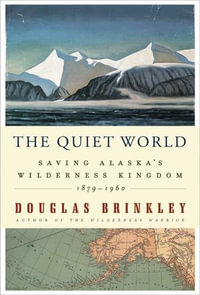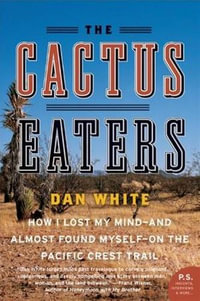
Food Webs and Biodiversity
Foundations, Models, Data
By: Axel G. Rossberg
eBook | 18 May 2016 | Edition Number 1
At a Glance
400 Pages
eBook
$107.99
or 4 interest-free payments of $27.00 with
orInstant Digital Delivery to your Booktopia Reader App
Food webs have now been addressed in empirical and theoretical research for more than 50 years. Yet, even elementary foundational issues are still hotly debated. One difficulty is that a multitude of processes need to be taken into account to understand the patterns found empirically in the structure of food webs and communities.
Food Webs and Biodiversity develops a fresh, comprehensive perspective on food webs. Mechanistic explanations for several known macroecological patterns are derived from a few fundamental concepts, which are quantitatively linked to field-observables. An argument is developed that food webs will often be the key to understanding patterns of biodiversity at community level.
Key Features:
- Predicts generic characteristics of ecological communities in invasion-extirpation equilibrium.
- Generalizes the theory of competition to food webs with arbitrary topologies.
- Presents a new, testable quantitative theory for the mechanisms determining species richness in food webs, and other new results.
- Written by an internationally respected expert in the field.
With global warming and other pressures on ecosystems rising, understanding and protecting biodiversity is a cause of international concern. This highly topical book will be of interest to a wide ranging audience, including not only graduate students and practitioners in community and conservation ecology but also the complex-systems research community as well as mathematicians and physicists interested in the theory of networks.
"This is a comprehensive work outlining a large array of very novel and potentially game-changing ideas in food web ecology."
—Ken Haste Andersen, Technical University of Denmark
"I believe that this will be a landmark book in community ecology ... it presents a well-established and consistent mathematical theory of food-webs. It is testable in many ways and the author finds remarkable agreements between predictions and reality."
*—*Geza Meszena, Eotvos University, Budapest
on
List of Symbols xix
Part I Preliminaries
1 Introduction 3
2 Models and Theories 7
2.1 The usefulness of models 7
2.2 What models should model 8
2.3 The possibility of ecological theory 10
2.4 Theory-driven ecological research 11
3 Some Basic Concepts 13
3.1 Basic concepts of food-web studies 13
3.2 Physical quantities and dimensions 15
Part II Elements of Food-Web Models
4 Energy and Biomass Budgets 19
4.1 Currencies of accounting 19
4.2 Rates and efficiencies 20
4.3 Energy budgets in food webs 21
5 Allometric Scaling Relationships Between Body Size and Physiological Rates 25
5.1 Scales and scaling 25
5.2 Allometric scaling 26
6 Population Dynamics 29
6.1 Basic considerations 29
6.1.1 Exponential population growth 29
6.1.2 Five complications 30
6.1.3 Environmental variability 31
6.2 Structured populations and density-dependence 32
6.2.1 The dilemma between species and stages 32
6.2.2 Explicitly stage-structured population dynamics 32
6.2.3 Communities of structured populations 35
6.3 The Quasi-Neutral Approximation 35
6.3.1 The emergence of food webs 35
6.3.2 Rana catesbeiana and its resources 35
6.3.3 Numerical test of the approximation 38
6.4 Reproductive value 40
6.4.1 The concept of reproductive value 40
6.4.2 The role of reproductive value in the QNA 40
6.4.3 Body mass as a proxy for reproductive value 40
7 From Trophic Interactions to Trophic Link Strengths 45
7.1 Functional and numerical responses 45
7.2 Three models for functional responses 46
7.2.1 Linear response 46
7.2.2 Type II response 46
7.2.3 Type II response with prey switching 47
7.2.4 Strengths and weaknesses of these models 48
7.3 Food webs as networks of trophic link strengths 48
7.3.1 The ontology of trophic link strengths 48
7.3.2 Variability of trophic link strengths 49
8 Tropic Niche Space and Trophic Traits 51
8.1 Topology and dimensionality of trophic niche space 52
8.1.1 Formal setting 52
8.1.2 Definition of trophic niche-space dimensionality 53
8.2 Examples and ecological interpretations 55
8.2.1 A minimal example 55
8.2.2 Is the definition of dimensionality reasonable? 55
8.2.3 Dependencies between vulnerability and foraging traits of a species 56
8.2.4 The range of phenotypes considered affects niche-space dimensionality 56
8.3 Determination of trophic niche-space dimensionality 58
8.3.1 Typical empirical data 58
8.3.2 Direct estimation of dimensionality 59
8.3.3 Iterative estimation of dimensionality 59
8.4 Identification of trophic traits 60
8.4.1 Formal setting 60
8.4.2 Dimensional reduction 62
8.5 The geometry of trophic niche space 65
8.5.1 Abstract trophic traits 65
8.5.2 Indeterminacy in abstract trophic traits 65
8.5.3 The D-dimensional niche space as a pseudo-Euclidean space 66
8.5.4 Linear transformations of abstract trophic traits 67
8.5.5 Non-linear transformations of abstract trophic traits 68
8.5.6 Standardization and interpretation of abstract trophic traits 69
8.5.7 A hypothesis and a convention 72
8.5.8 Getting oriented in trophic niche space 73
8.6 Conclusions 75
9 Community Turnover and Evolution 77
9.1 The spatial scale of interest 77
9.2 How communities evolve 78
9.3 The mutation-for-dispersion trick 79
9.4 Mutation-for-dispersion in a neutral food-web model 80
10 The Population-Dynamical Matching Model 81
Part III Mechanisms and Processes
11 Basic Characterizations of Link-Strength Distributions 87
11.1 Modelling the distribution of logarithmic link strengths 88
11.1.1 General normally distributed trophic traits 88
11.1.2 Isotropically distributed trophic traits 91
11.2 High-dimensional trophic niche spaces 93
11.2.1 Understanding link stengths in high-dimensional trophic niche spaces 93
11.2.2 Log-normal probability distributions 94
11.2.3 The limit of log-normally distributed trophic link strength 95
11.2.4 Correlations between trophic link strengths 96
11.2.5 The distribution of the strengths of observable links 97
11.2.6 The probability of observing links (connectance) 99
11.2.7 Estimation of link-strength spread and Pareto exponent 100
11.2.8 Empirical examples 101
12 Diet Partitioning 103
12.1 The diet partitioning function 103
12.1.1 Relation to the probability distribution of diet proportions 105
12.1.2 Another probabilistic interpretation of the DPF 106
12.1.3 The normalization property of the DPF 106
12.1.4 Empirical determination of the DPF 107
12.2 Modelling the DPF 107
12.2.1 Formal setting 107
12.2.2 Diet ratios 108
12.2.3 The DPF for high-dimensional trophic niche spaces 109
12.2.4 Gini-Simpson dietary diversity 110
12.2.5 Dependence of the DPF on niche-space dimensionality 112
12.3 Comparison with data 113
12.4 Conclusions 114
13 Multivariate Link-Strength Distributions and Phylogenetic Patterns 117
13.1 Modelling phylogenetic structure in trophic traits 118
13.1.1 Phylogenetic correlations among logarithmic link strengths 120
13.1.2 Phylogenetic correlations among link strengths 121
13.1.3 Phylogenetic patterns in binary food webs 122
13.2 The matching model 123
13.2.1 A simple model for phylogenetic structure in food webs 123
13.2.2 Definition of the matching model 124
13.2.3 Sampling steady-state matching model food webs 124
13.2.4 Alternatives to the matching model 126
13.3 Characteristics of phylogenetically structured food webs 126
13.3.1 Graphical representation of food-web topologies 127
13.3.2 Standard parameter values 127
13.3.3 Intervality 128
13.3.4 Intervality and trophic niche-space dimensionality 129
13.3.5 Degree distributions 131
13.3.6 Other phylogenetic patterns 134
13.3.7 Is phylogeny just a nuisance? 135
14 A Framework Theory for Community Assembly 137
14.1 Ecological communities as dynamical systems 137
14.2 Existence, positivity, stability, and permanence 138
14.3 Generic bifurcations in community dynamics and their ecological phenomenology 139
14.3.1 General concepts 139
14.3.2 Saddle-node bifurcations 140
14.3.3 Hopf bifurcations 142
14.3.4 Transcritical bifurcations 142
14.3.5 Bifurcations of complicated attractors 144
14.4 Comparison with observations 144
14.4.1 Extirpations and invasions proceed slowly 145
14.4.2 The logistic equation works quite well 145
14.4.3 IUCN Red-List criteria highlight specific extinction scenarios 147
14.4.4 Conclusion 148
14.5 Invasion fitness and harvesting resistance 148
14.5.1 Invasion fitness 148
14.5.2 Harvesting resistance: definition 149
14.5.3 Harvesting resistance: interpretation 149
14.5.4 Harvesting resistance: computation 151
14.5.5 Interpretation of h ? 0 152
14.6 Community assembly and stochastic species packing 152
14.6.1 Community saturation and species packing 152
14.6.2 Invasion probability 154
14.6.3 The steady-state distribution of harvesting resistance 157
14.6.4 The scenario of stochastic species packing 158
14.6.5 A numerical example 160
14.6.6 Biodiversity and ecosystem functioning 162
15 Competition in Food Webs 165
15.1 Basic concepts 166
15.1.1 Modes of competition 166
15.1.2 Interactions in communities 166
15.2 Competition in two-level food webs 167
15.2.1 The Lotka-Volterra two-level food-web model 168
15.2.2 Computation of the equilibrium point 168
15.2.3 Direct competition among producers 169
15.2.4 Resource-mediated competition in two-level food webs 169
15.2.5 Consumer-mediated competition in two-level food webs 170
15.3 Competition in arbitrary food webs 173
15.3.1 The general Lotka-Volterra food-web model 173
15.3.2 The competition matrix for general food webs 174
15.3.3 The L-R-P formalism 176
15.3.4 Ecological interpretations of the matrices L, R, and P 176
15.3.5 Formal computation of the equilibrium point 177
15.3.6 Consumer-mediated competition in general food webs 178
15.3.7 Consumer-mediated competitive exclusion 179
15.3.8 Conclusions 179
16 Mean-Field Theory of Resource-Mediated Competition 181
16.1 Transition to scaled variables 182
16.1.1 The competitive overlap matrix 182
16.1.2 Free abundances 183
16.2 The extended mean-field theory of competitive exclusion 184
16.2.1 Assumptions 184
16.2.2 Separation of means and residuals 186
16.2.3 Mean-field theory for the mean scaled abundance 187
16.2.4 Mean-field theory for the variance of scaled abundance 188
16.2.5 The coefficient of variation of scaled abundance 190
16.2.6 Related theories 191
17 Resource-Mediated Competition and Assembly 193
17.1 Preparation 193
17.1.1 Scaled vs. unscaled variables and parameters 193
17.1.2 Mean-field vs framework theory 195
17.2 Stochastic species packing under asymmetric competition 197
17.2.1 Species richness and distribution of invasion fitness (Part I) 198
17.2.2 Community response to invasion 199
17.2.3 Sensitivity of residents to invaders 200
17.2.4 Species richness and distribution of invasion fitness (Part II) 203
17.2.5 Random walks of abundances driven by invasions 204
17.2.6 Further discussion of the scenario 206
17.3 Stochastic species packing with competition symmetry 207
17.3.1 Community assembly with perfectly symmetric competition 207
17.3.2 Community assembly under nearly perfectly symmetric competition 209
17.3.3 Outline of mechanism limiting competition avoidance 211
17.3.4 The distribution of invasion fitness 212
17.3.5 Competition between residents and invaders 213
17.3.6 Balance of scaled biomass during assembly 214
17.3.7 Competition avoidance 215
17.3.8 Numerical test of the theory 216
18 Random-Matrix Competition Theory 221
18.1 Asymmetric competition 221
18.1.1 Girko's Law 221
18.1.2 Application to competitive overlap matrices 223
18.1.3 Implications for sensitivity to invaders 223
18.1.4 Relation to mean-field theory 224
18.2 Stability vs feasibility limits to species richness 225
18.2.1 The result of May (1972) 225
18.2.2 Comparison of stability and feasibility criteria 225
18.3 Partially and fully symmetric competition 226
18.4 Sparse overlap matrices 228
18.4.1 Sparse competition 228
18.4.2 Eigenvalue distributions for sparse matrices 228
18.5 Resource overlap matrices 230
18.5.1 Diffuse resource competition 230
18.5.2 Sparse resource competition: the basic problem 232
18.5.3 The effect of trophic niche-space geometry 235
18.5.4 Competition among highly specialized consumers 237
18.5.5 Resource competition for varying ratios of producer to consumer richness 237
18.5.6 Competition for competing resources 239
18.6 Comparison with data 242
18.6.1 Gall-inducing insects on plants 242
18.6.2 Freshwater ecosystems 243
18.6.3 The North Sea 244
18.6.4 Conclusions 244
19 Species Richness, Size and Trophic Level 247
19.1 Predator-prey mass ratios 247
19.2 Modelling the joint distribution of size, trophic level, and species richness 249
19.2.1 Initial considerations 249
19.2.2 Model definition 251
19.2.3 Model simulation and comparison with data 252
20 Consumer-Mediated Competition and Assembly 255
20.1 A two-level food-web assembly model 256
20.2 Analytic characterization of the model steady state 257
20.2.1 Mechanism controlling producer richness 257
20.2.2 Other characteristics of the model steady state 259
20.3 Dependence of invader impacts on dietary diversity 262
20.3.1 Formal setting 262
20.3.2 Invadibility condition 263
20.3.3 Extirpation of resources during invasion 263
20.3.4 Extirpation of resources through consumer-mediated competition 264
20.3.5 Synthesis 264
20.4 Evolution of base attack rates 266
20.4.1 Motivation 266
20.4.2 Model definition 267
20.4.3 Numerical demonstration of attack rate evolution 267
20.4.4 Attack-rate evolution and prudent predation 268
21 Food Chains and Size Spectra 271
21.1 Concepts 271
21.1.1 Community size spectra 271
21.1.2 Species size spectra 273
21.2 Power-law food chains 274
21.2.1 Infinitely long power-law food chains 274
21.2.2 Top-down and bottom-up control 276
21.2.3 Power law-food chains of finite lengths and their stability to pulse
perturbations 278
21.2.4 Food chains as approximations for size spectra 279
21.2.5 Adaptation of attack rates 281
21.3 Food chains with non-linear functional responses 281
21.3.1 Loss of stability with density-independent consumption 282
21.3.2 Linearization of a generalized food chain model 283
21.3.3 Linear responses to press perturbations 284
21.3.4 Linear stability to pulse perturbations 285
21.4 What are the mechanisms controlling the scaling laws? 290
21.4.1 Arguments for biological constraints on transfer efficiency 290
21.4.2 Arguments for stability constraints on transfer efficiency 291
21.4.3 Arguments for ecological constraints on biomass imbalance 291
21.4.4 Arguments for mechanical constraints on PPMR 292
21.4.5 Arguments for dynamical constraints on PPMR 293
21.4.6 Conclusions 293
21.5 Scavengers and detrivores 294
21.5.1 The general argument 294
21.5.2 The microbial loop and other detrital channels 294
22 Structure and Dynamics of PDMM Model Communities 297
22.1 PDMM model definition 298
22.1.1 Model states 298
22.1.2 Species sampling and community assembly 298
22.1.3 Population dynamics 301
22.2 PDMM simulations 303
22.2.1 Trophic niche space and phylogenetic correlations 304
22.2.2 Steady state and invasion fitness 307
22.2.3 Diet partitioning 309
22.2.4 Resource-mediated competition 310
22.2.5 Distribution of species over body sizes and trophic levels 311
22.2.6 The size spectrum and related distributions 312
22.3 The PDMM with evolving attack rates 314
22.3.1 Modelling and tracking evolving attack rates in the PDMM 314
22.3.2 Time series of species richness, aggressivity and dietary diversity 315
22.3.3 Mutual regulation of aggressivity and dietary diversity 316
22.4 Conclusions 318
Part IV Implications
23 Scientific Implications 323
23.1 Main mechanisms identified by the theory 323
23.1.1 Two trades - one currency 323
23.1.2 Resource-mediated competition 324
23.1.3 Randomness and structure in food webs 324
23.1.4 Consumer-mediated competition and attack-rate evolution 325
23.2 Testable assumptions and predictions 325
23.2.1 Link-strength distributions and trophic niche-space geometry 325
23.2.2 Diet-partitioning statistics and sampling curves 325
23.2.3 Prey switching 326
23.2.4 Adapted attack rates 326
23.2.5 Community assembly and turnover 326
23.2.6 Patterns in link-strength matrices 327
23.3 Some unsolved problems 327
23.3.1 Large plants 327
23.3.2 Interactions between modes of competition 327
23.3.3 Absolute species richness: the role of viruses 327
23.3.4 The role of prey switching for community structure 328
23.3.5 The role of phylogenetic correlations for community dynamics 328
23.3.6 Fundamental constraints determining size-spectrum slopes 328
23.3.7 Community assembly with non-trivial attractors 328
23.3.8 Solution of the Riccati Equation for resource competition 328
23.3.9 Eigenvalues of competition matrices 329
23.3.10 Geometry and topology of trophic niche space 329
23.4 The future of community ecology 329
24 Conservation Implications 331
24.1 Assessing biodiversity 331
24.1.1 Quantifying biodiversity 331
24.1.2 Biodiversity supporting biodiversity 331
24.1.3 Assessing community turnover 332
24.2 Modelling ecological communities 333
24.2.1 Unpredictability of long-term community responses 333
24.2.2 Short-term predictions of community responses 334
24.2.3 Coarse-grained and stochastic community models 334
24.3 Managing biodiversity 334
Appendix A 337
A.1 Mathematical concepts, formulae, and jargon 337
A.1.1 Sums 337
A.1.2 Complex numbers 338
A.1.3 Vectors and matrices 339
A.1.4 Sets and functions 343
A.1.5 Differential calculus 343
A.1.6 Integrals 344
A.1.7 Differential equations 345
A.1.8 Random variables and expectation values 346
Bibliography 349
Index 365
ISBN: 9781118502174
ISBN-10: 1118502175
Published: 18th May 2016
Format: ePUB
Language: English
Number of Pages: 400
Audience: Professional and Scholarly
Publisher: Wiley
Country of Publication: GB
Edition Number: 1
You Can Find This eBook In

eBOOK
RRP $28.59
$22.99
OFF

eBOOK
RRP $38.49
$30.99
OFF
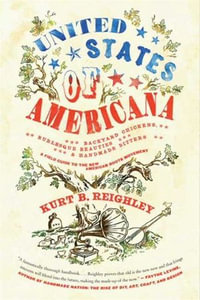
eBOOK
RRP $24.19
$19.99
OFF

eBOOK
RRP $37.39
$29.99
OFF
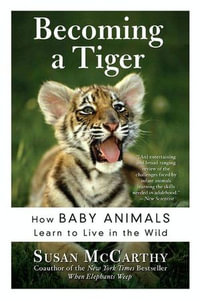
eBOOK
RRP $31.89
$25.99
OFF
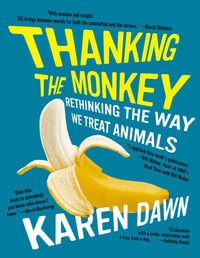
eBOOK
RRP $28.59
$22.99
OFF
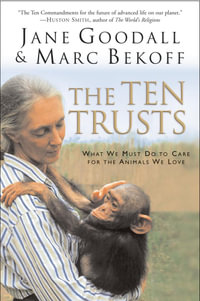
eBOOK
RRP $28.59
$22.99
OFF

eBOOK
RRP $28.59
$22.99
OFF

eBOOK
RRP $17.59
$14.99
OFF
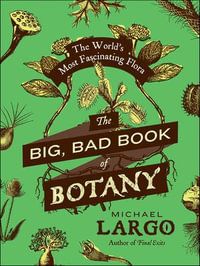
eBOOK
RRP $27.49
$21.99
OFF

eBOOK
RRP $27.49
$21.99
OFF

eBOOK
RRP $28.59
$22.99
OFF
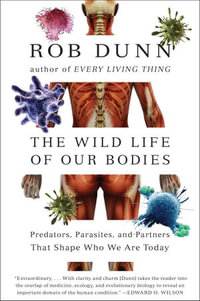
eBOOK
RRP $14.29
$11.99
OFF
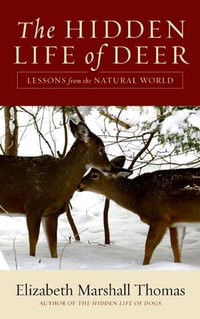
eBOOK
RRP $27.49
$21.99
OFF

eBOOK
$10.99

eBOOK
RRP $28.59
$22.99
OFF

eBOOK
A Garden of Marvels
How We Discovered that Flowers Have Sex, Leaves Eat Air, and Other Secrets of Plants
eBook
RRP $27.49
$21.99
OFF

